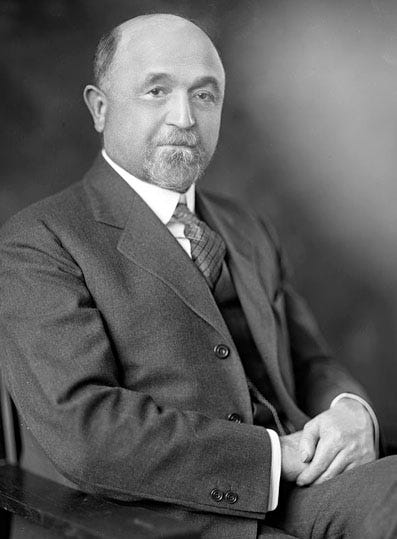We're Getting Unitary Executive Doctrine Good and Hard
Raise your hand if you think the Supreme Court should hand Donald Trump more power. Anyone? Bueller?
William Humphrey, the obnoxious FTC commissioner President Franklin Roosevelt couldn’t fire. Library of Congress.
On October 7, 1933, President Franklin Roosevelt fired William Humphrey, who’d been appointed to the Federal Trade Commission by President Calvin Coolidge; reappointed by President Herbert Hoover; and confirmed both times by the Senate. Humphrey opposed the New Deal, and FDR wanted him gone. But when Humphrey got his pink slip he sued, arguing he had five years to go before his seven-year term as FTC commissioner was up. A year later Humphrey did Roosevelt the great favor of dying from a stroke before the Supreme Court could hear his case. But Humphrey’s executor continued the lawsuit and won in the Supreme Court, which awarded Humphrey’s heirs back pay to the time of his death.
Humphrey wasn’t just conservative; he was rude and disruptive, given to berating his fellow commissioners and even the FTC itself (he once called it “a publicity bureau to spread socialist propaganda”). You might say Humphrey was MAGA avant la lettre. In response to a letter of criticism from his fellow Republican Gifford Pinchot, the first chief of the United States Forest Service under Theodore Roosevelt and former governor of Pennsylvania, Humphrey wrote: “Your letter of unregurgitated filth received. For your own famished sake, and for the infinite relief of the country, have your keeper lead you to a thistle patch.” Humphrey was a prize jerk, and everybody knew it.
Yet even so, in Humphrey’s Executor v. the United States (1935) the Supreme Court concluded that Roosevelt lacked the power to fire this prize jerk because the statute creating the FTC in 1914 stated that the president could dismiss a commissioner only for cause. The FTC, the court said, was “an independent, nonpartisan body of experts, charged with duties neither political nor executive, but predominantly quasi-judicial and quasi-legislative.” Such bodies, today known as independent agencies, were different from other executive branch agencies and Cabinet departments.
Humphrey wasn’t going to come back from the dead to retake his FTC commissionership, but even so the Supreme Court’s ruling drove Roosevelt batty. Indeed, the Brain Truster Rexford Tugwell later suggested it was Humphrey’s Executor more than any other decision that prompted FDR two years later to attempt to pack the court. (I’m grateful for this history to Thomas K. McCraw’s Prophets of Regulation, 1984, and Michael Hiltzik’s The New Deal: A Modern History, 2011.)
In the 90 years that followed, no president fired a commissioner or board member of an independent agency except for cause. That tradition ended last week when Trump unloaded two commissioners at the Equal Employment Opportunity Commission and a board member at the National Labor Relations Board.
The fired government officials will probably be reinstated by a district court, but President Donald Trump will surely appeal all the way up to the Supreme Court, which has been looking for an opportunity to overturn Humphrey’s Executor. It’s all part of a conservative legal doctrine, dating to the 1980s, called the “unitary executive,” which says presidents have the power to fire any non-civil-service-protected executive-branch official that they goddamned well like. (Trump also wants unlimited power to fire civil servants, but that would be unitary executive theory on steroids.) If Trump wins at the Supreme Court level, he will become the first unitary president. Even most conservatives who believe in unitary executive theory would probably agree, in private, that Trump is not the sort of unitary executive they had in mind. Anyway, that’s the subject of my latest New Republic piece. You can read it here.



N-O F👀C-K-N-G W-A-Y ‼️
What a story!!!!!!!